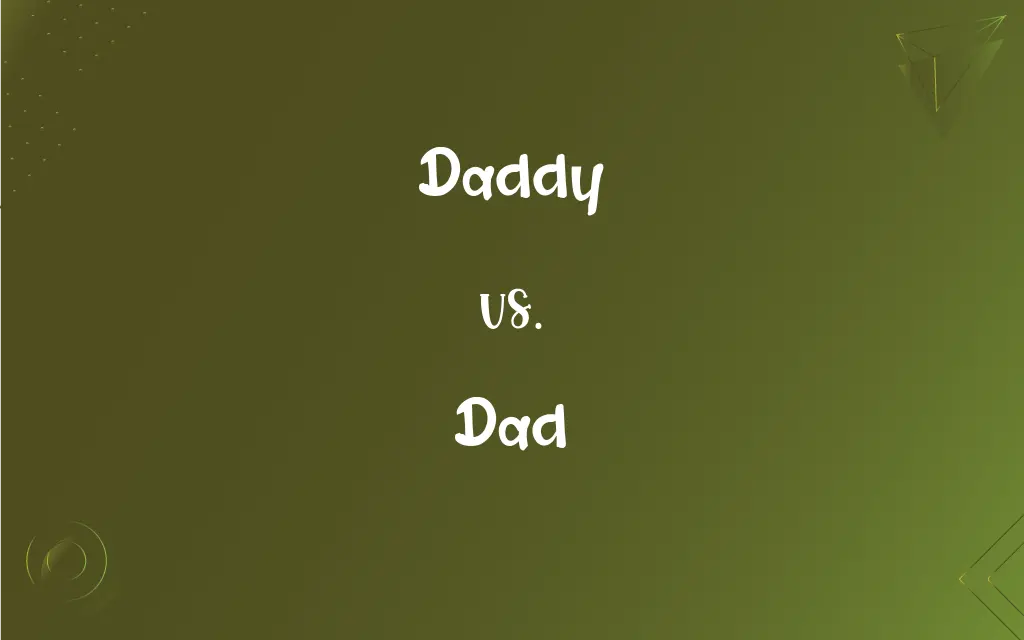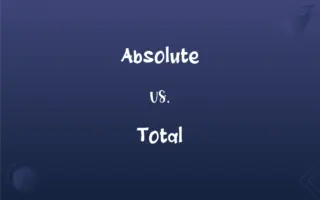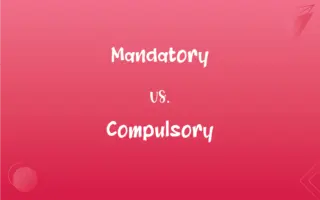Daddy vs. Dad: What's the Difference?
Edited by Harlon Moss || By Janet White || Updated on October 7, 2023
"Daddy" is a more affectionate or childlike term for one's father, while "Dad" is a more casual and commonly used term for a male parent.

Key Differences
"Daddy" is often associated with the more intimate, tender moments shared between a child and their father. It is usually one of the first words a child learns and utilizes to address their father. On the other hand, "Dad" is a shorthand, more universally understood term denoting a male parent or guardian.
When one thinks of the term "Daddy," images of younger children clinging to their fathers or asking for bedtime stories might come to mind. "Dad" can encompass a broader age range, from toddlers to adults, in addressing their fathers.
The word "Daddy" carries with it an element of endearment and can sometimes be used beyond just familial ties, in romantic or cultural contexts. Meanwhile, "Dad" is straightforward and is primarily restricted to the context of familial relationships.
In popular culture, songs or stories that wish to evoke feelings of nostalgia or deep emotion might choose the term "Daddy" to emphasize that bond. "Dad" might be chosen for more everyday contexts or to describe general fatherly roles or responsibilities.
From a linguistic standpoint, "Daddy" has a diminutive suffix, indicating its more affectionate tone. "Dad" is concise, making it a more practical choice for general conversations or writing.
ADVERTISEMENT
Comparison Chart
Tone
Affectionate, childlike
Casual, standard
Common Usage Age
Used more by younger children
Used by people of all ages
Linguistic Element
Diminutive suffix indicates endearment
Short, practical term
Cultural Context
Can be used in romantic/cultural contexts
Primarily familial
Portrayal in Media
Elicits deeper emotions or nostalgia
Represents general fatherly roles
ADVERTISEMENT
Daddy and Dad Definitions
Daddy
A term of endearment used in romantic relationships.
Thanks for the gift, Daddy!
Dad
A reference to a male parental figure.
He's been like a Dad to me.
Daddy
A term that can be used to signify a protector or caregiver.
He's always been the Daddy of the group, taking care of everyone.
Dad
A common term for one's father.
Hey Dad, where are my keys?
Daddy
A cultural term, sometimes referencing someone with authority or control.
He's the Daddy of the business world.
Dad
A colloquial term for a man who embodies fatherly characteristics.
Steve tells so many puns; he's such a Dad.
Daddy
An informal term used for one's biological father.
Daddy, can we go to the park?
Dad
A term used to highlight responsibility or authority in familial context.
Ask Dad; he'll know the answer.
Daddy
A tender term young children use for their father.
I love you, Daddy!
Dad
Informal address for an older male figure.
Thanks, Dad. I appreciate the advice.
Daddy
A father.
Dad
A father.
Daddy
Father.
Dad
(informal) A father, a male parent.
His dad was always there for him.
Daddy
A male lover.
Dad
Used to address one's father
Happy Father's Day, Dad!
Daddy
An informal term of address for a man.
Rock 'n' roll is cool, daddy, and you know it!
Dad
(slang) Used to address an older adult male
Daddy
A dominant male partner, often used as an address.
The guy I've been dating offered to do bondage with me, and I was like "Yes please, daddy."
Dad
(transitive) To throw against something; to dash.
Daddy
(slang) A male juvenile delinquent in a reformatory who dominates the other inmates through threats and violence.
Dad
Father; - a word sometimes used by children.
I was never so bethumped with words,Since I first called my brother's father dad.
Daddy
To father; to sire.
Dad
An informal term for a father; probably derived from baby talk
Daddy
Diminutive of Dad.
Daddy
An informal term for a father; probably derived from baby talk
FAQs
Can adults call their father "Dad"?
Absolutely, "Dad" is a universally used term by people of all ages.
Is "Daddy" used exclusively by children?
No, "Daddy" can also be used in romantic or cultural contexts beyond its childlike connotation.
Is there a difference in intimacy between "Daddy" and "Dad"?
Typically, "Daddy" is seen as a more affectionate or intimate term than "Dad."
Can "Daddy" be used outside of familial ties?
Yes, "Daddy" can be used as a term of endearment in romantic relationships or in certain cultural contexts.
Is there a difference in maturity between the terms?
"Daddy" is often associated with younger children, while "Dad" can be used by individuals of any age.
Are there any cultural implications when using "Daddy"?
Yes, "Daddy" can be used in cultural contexts, sometimes referring to someone with authority or control.
Is "Dad" a formal term?
"Dad" is casual and is a commonly used term for a male parent.
Can "Dad" be used to describe someone who isn't a biological father?
Yes, "Dad" can be used to describe someone who takes on a fatherly role, even if not biologically related.
From a linguistic standpoint, what makes "Daddy" affectionate?
"Daddy" has a diminutive suffix, which often indicates affection or endearment.
How prevalent is the term "Dad" in daily conversation?
"Dad" is very common and is a universally understood term denoting a male parent.
Is "Dad" ever used in a romantic context like "Daddy"?
Typically, "Dad" is used in familial contexts, whereas "Daddy" can sometimes be used romantically.
Are there any songs or media that popularize the term "Daddy"?
Yes, various songs and stories use "Daddy" to evoke feelings of nostalgia or emotion.
Can "Daddy" be used sarcastically?
Yes, like many words, "Daddy" can be used sarcastically or in jest in certain contexts.
Is "Daddy" more emotional than "Dad"?
In many contexts, "Daddy" can evoke deeper emotions or nostalgia compared to "Dad."
Do these terms have equivalents in other languages?
Yes, many languages have their own terms for "Daddy" and "Dad", often with similar nuances in tone and usage.
About Author
Written by
Janet WhiteJanet White has been an esteemed writer and blogger for Difference Wiki. Holding a Master's degree in Science and Medical Journalism from the prestigious Boston University, she has consistently demonstrated her expertise and passion for her field. When she's not immersed in her work, Janet relishes her time exercising, delving into a good book, and cherishing moments with friends and family.
Edited by
Harlon MossHarlon is a seasoned quality moderator and accomplished content writer for Difference Wiki. An alumnus of the prestigious University of California, he earned his degree in Computer Science. Leveraging his academic background, Harlon brings a meticulous and informed perspective to his work, ensuring content accuracy and excellence.































































